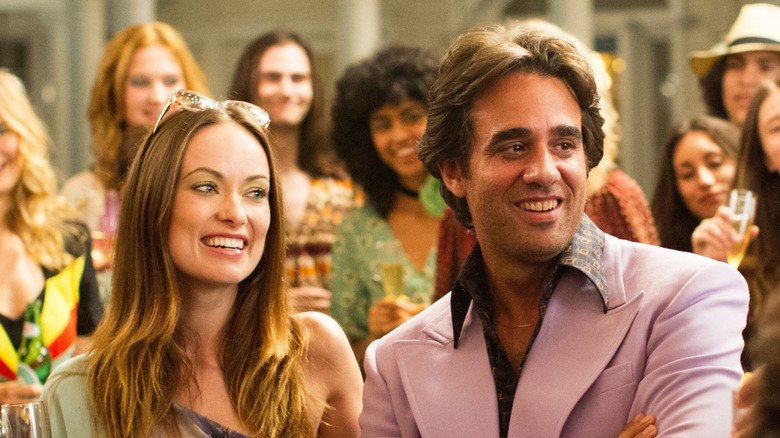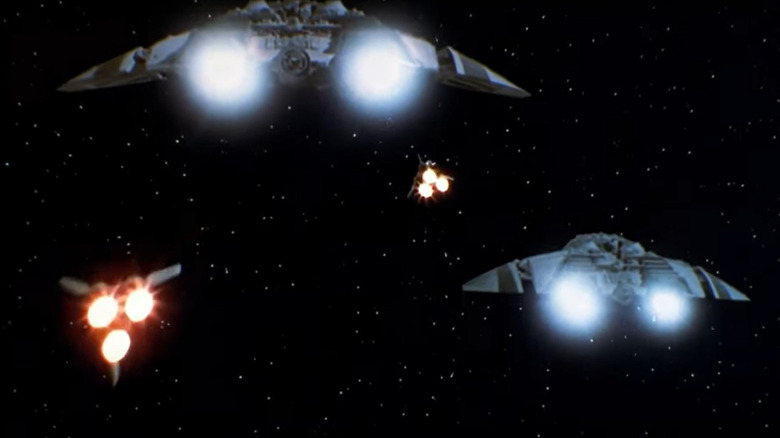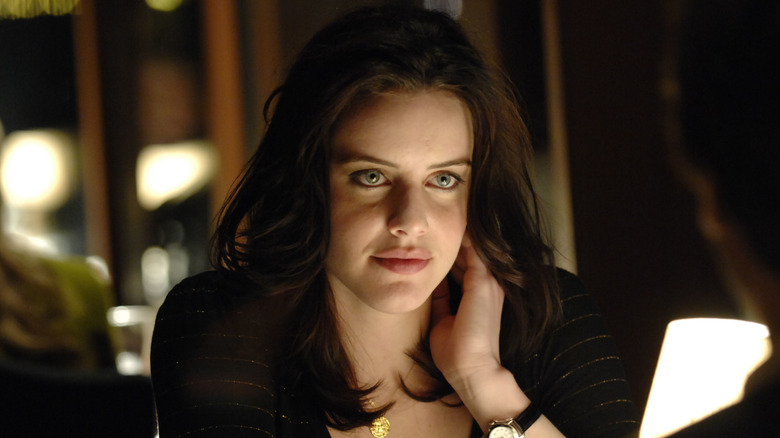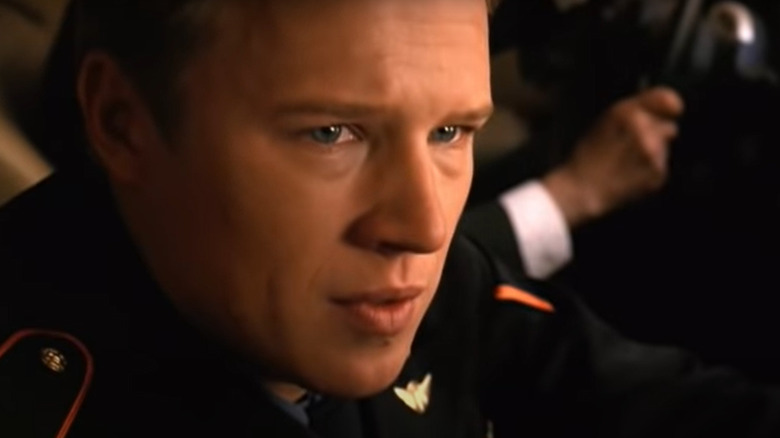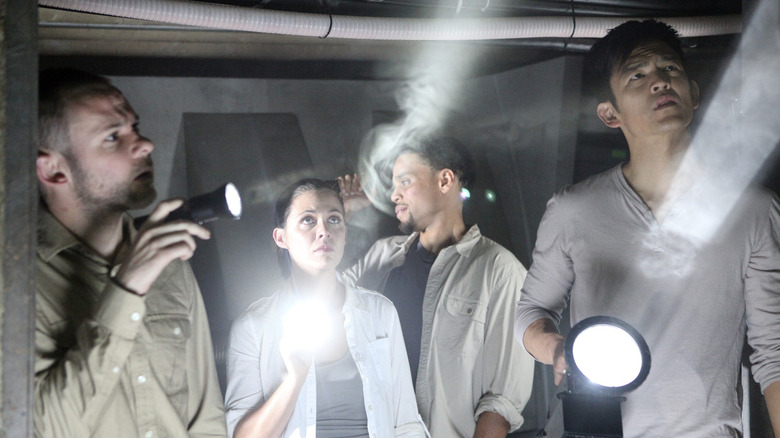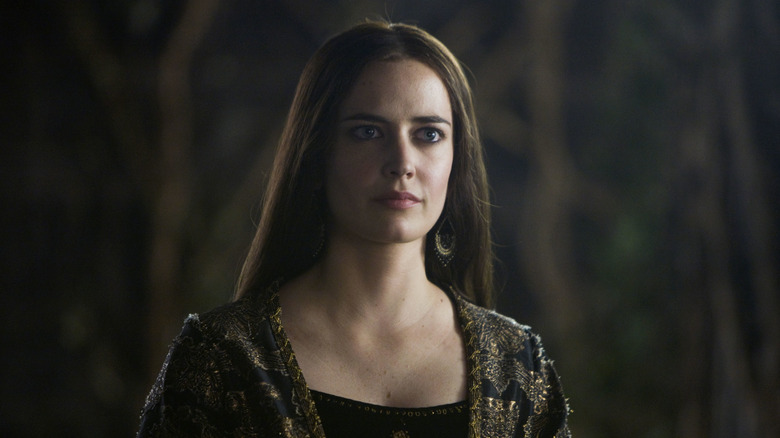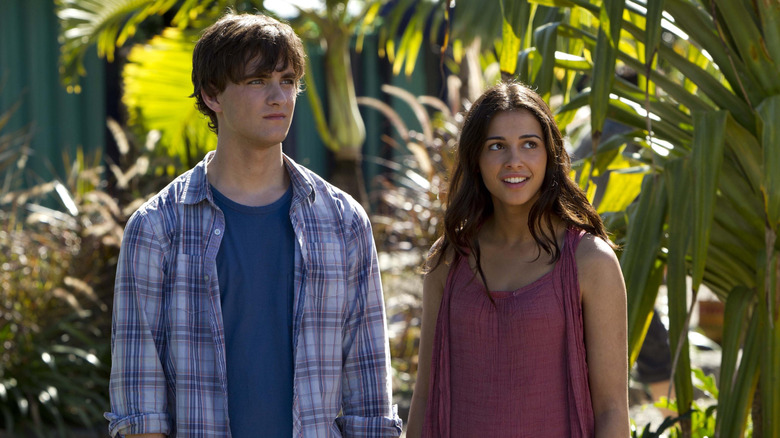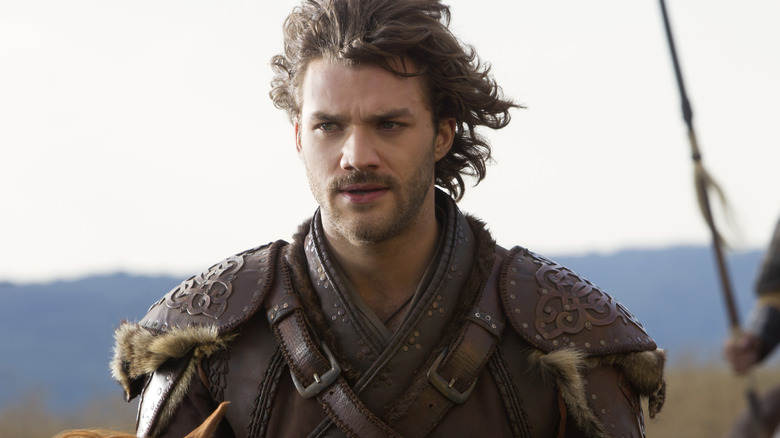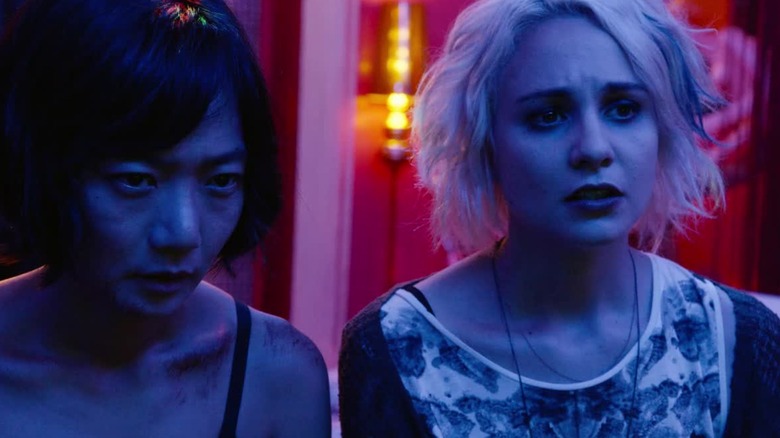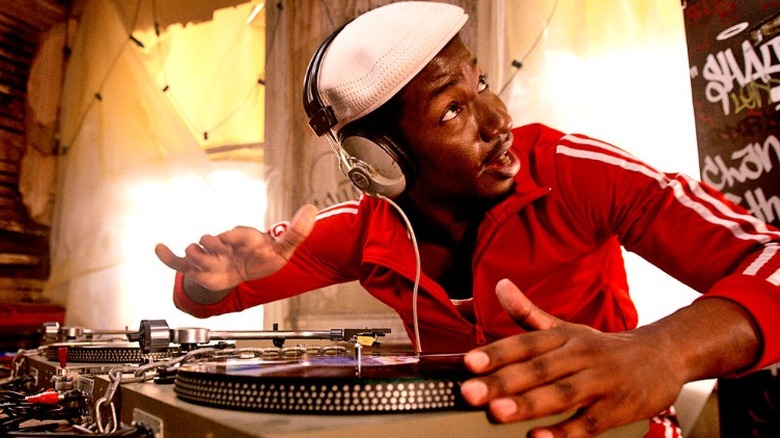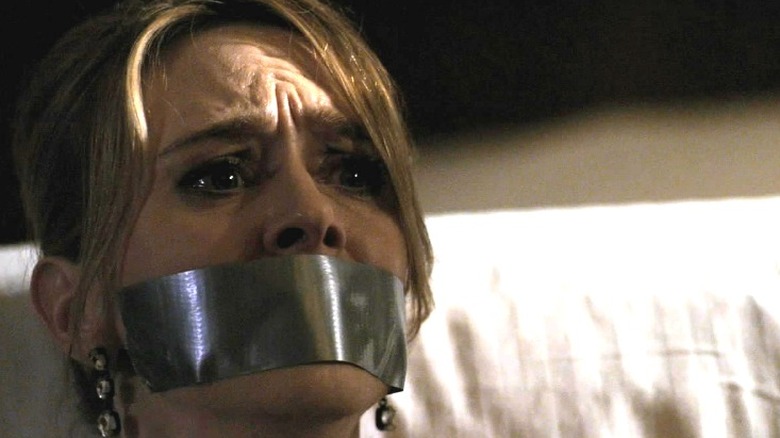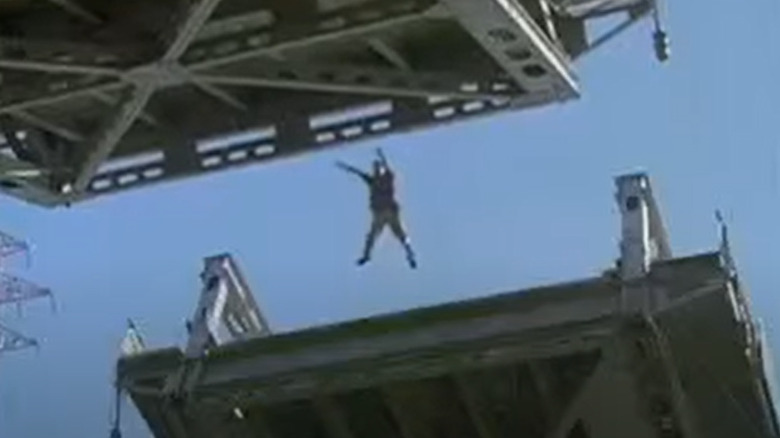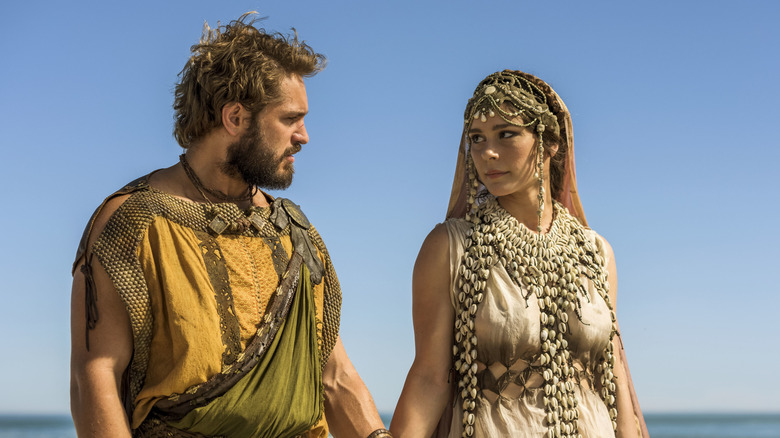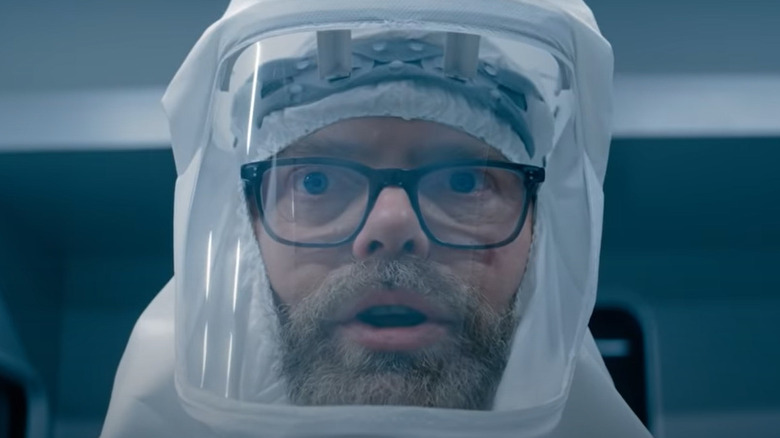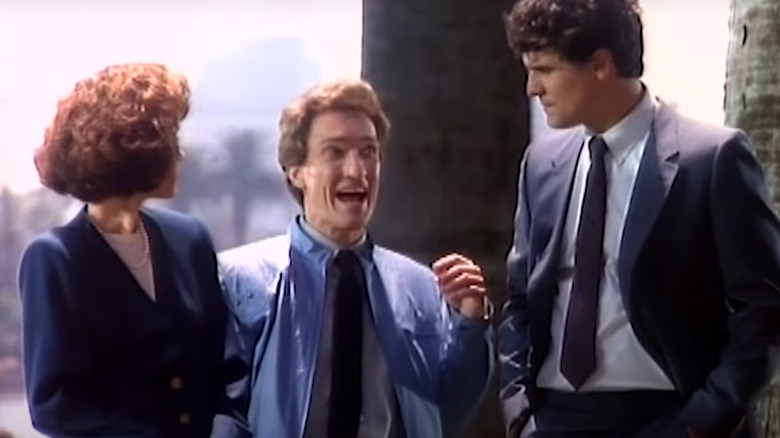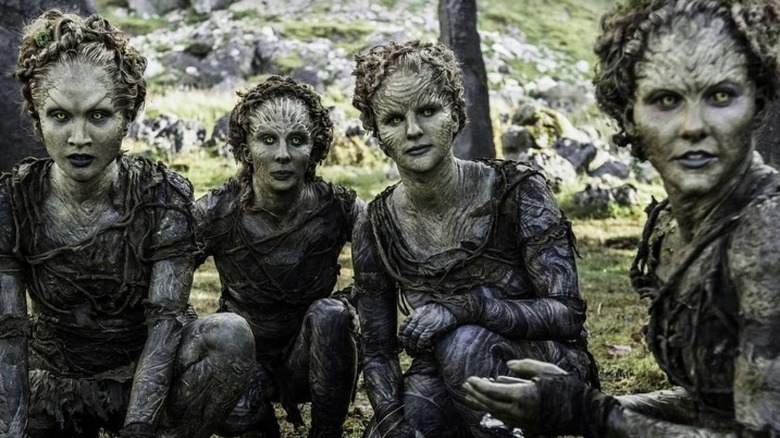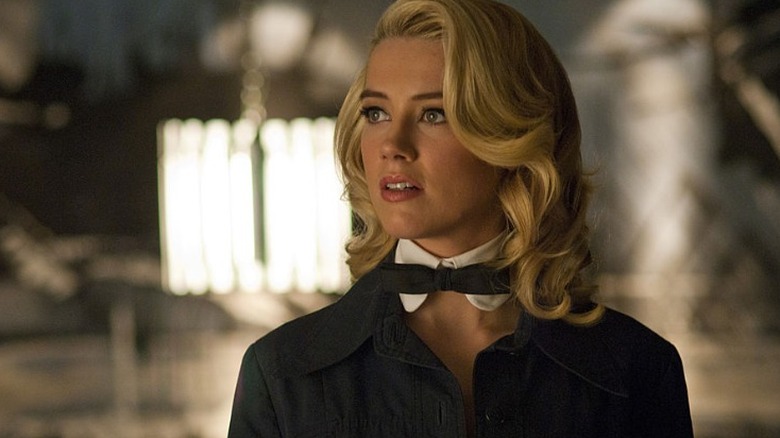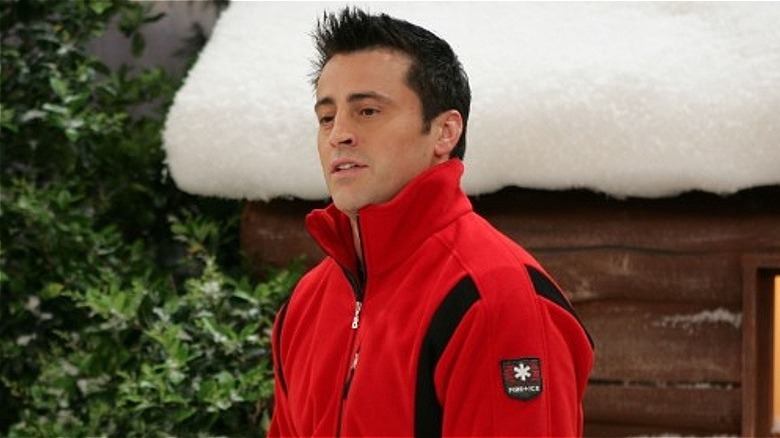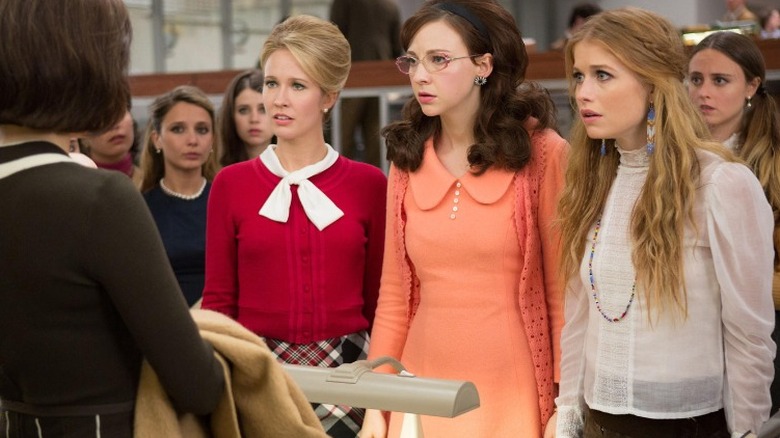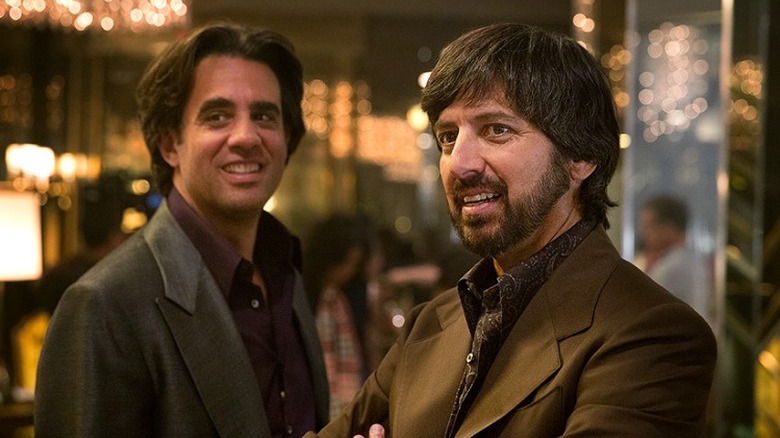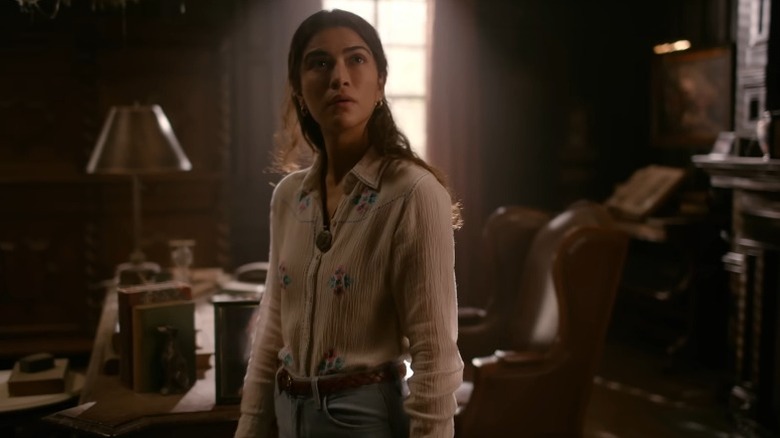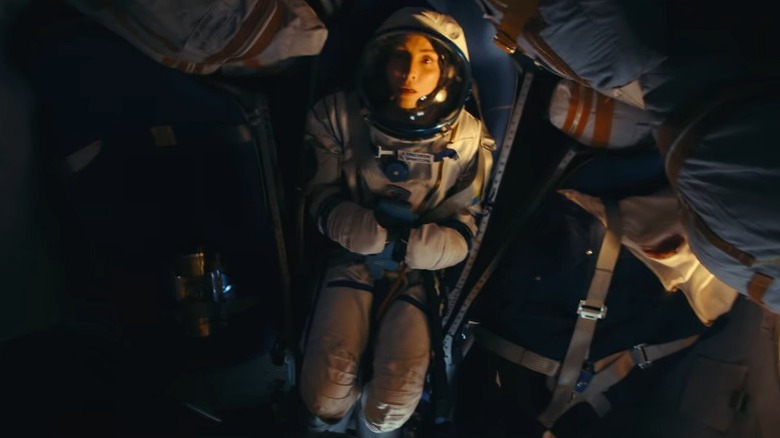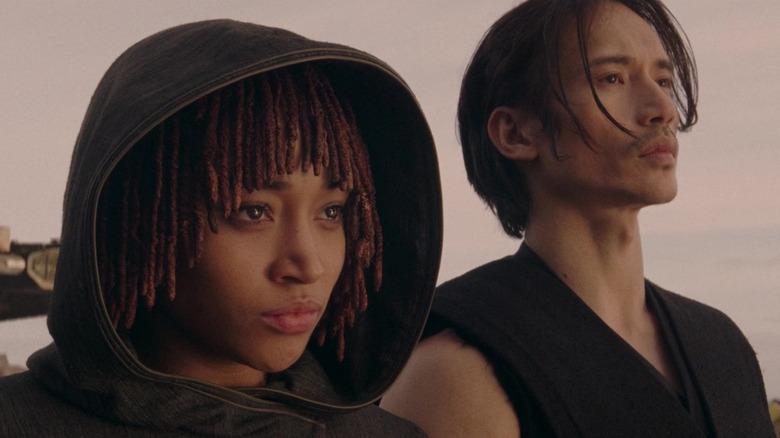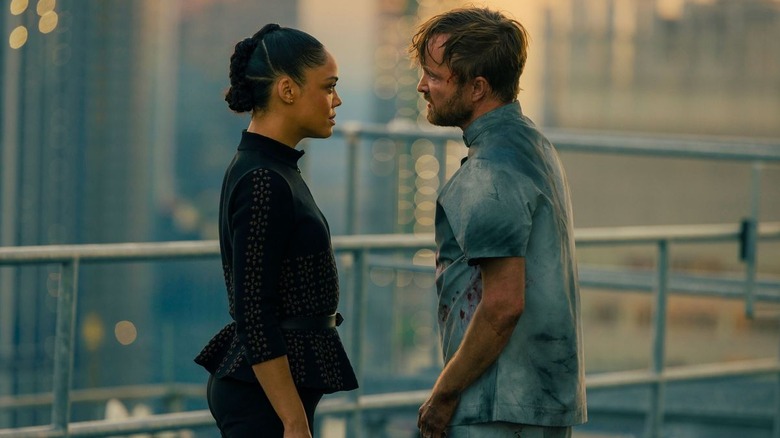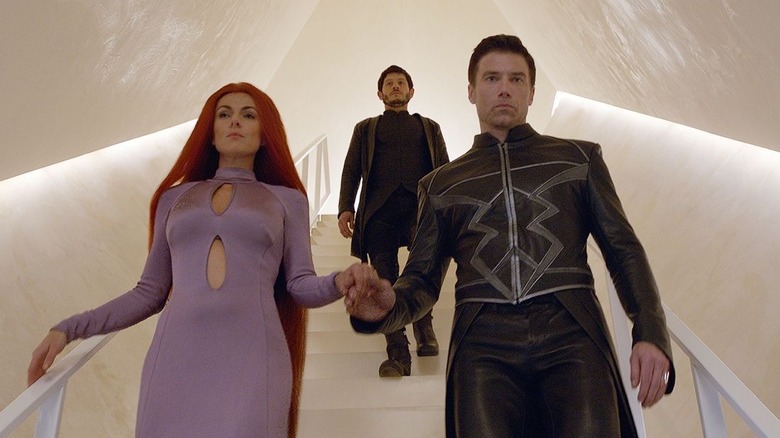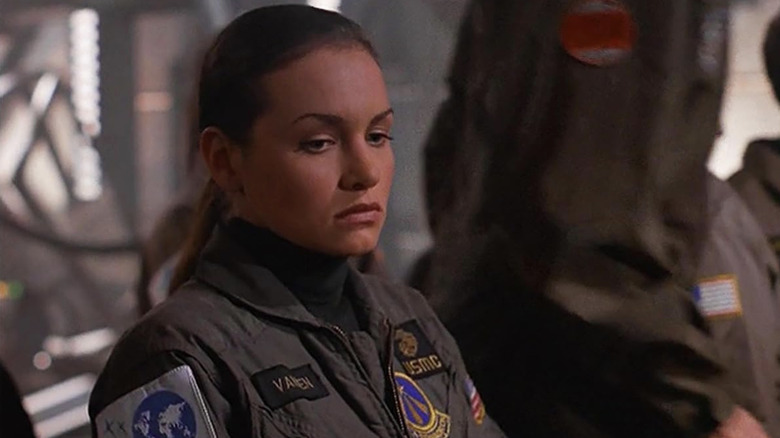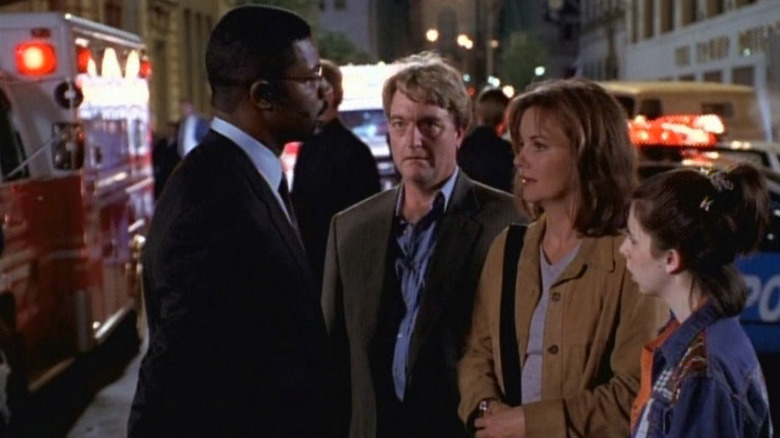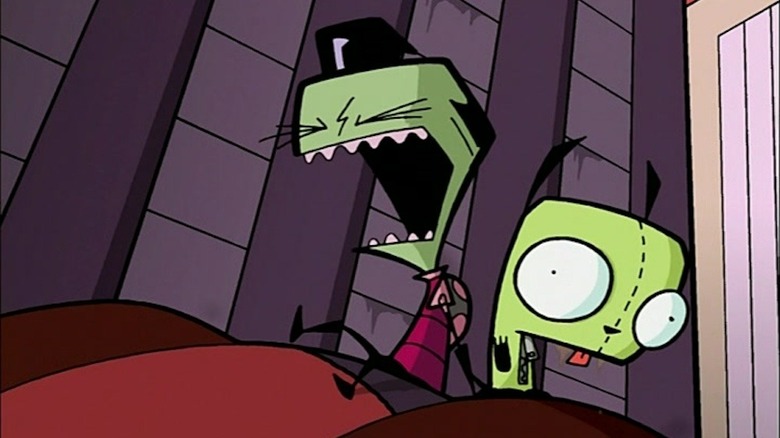The Most Expensive TV Flops In History
Who knows how many shows have been created since the television that became a household staple after World War II? Not us. What we do know is that these days, upwards of 450 to 500 shows are broadcast every year. Competition is fierce, and it always has been.
Because of that competition, networks are often willing to go the extra couple of miles and spend big money on projects they think will lure in the biggest audience. They place their bets ... and sometimes lose their shirts. Here are some of the most expensive flops to have their plugs pulled.
Battlestar Galactica
Most people today know "Battlestar Galactica" as the binge-worthy sci-fi television series which ran from 2003 to 2009. However, not so many people remember that the series originated in 1978 and was quite an expensive flop.
Setting out to be a small-screen "Star Wars" of sorts, "Battlestar Galactica" cost roughly $1 million per episode – more than double that of a typical prime-time show at the time. At first, it was worth the price tag. The series' early episodes attracted positive reviews and healthy ratings, but those ratings eventually began to slip, and some behind-the-scenes issues plagued the production. Censorship also made it hard to take "Battlestar Galactica" seriously. Supervising producer Don Bellisario once claimed that censorship "took the balls out of the Cylons."
Ultimately, "Battlestar Galactica" couldn't pull its weight as compared to other less-expensive network hits such as ABC's own "Mork and Mindy" or CBS' "All in the Family." ABC soon axed the series. The network did give it another go with "Galactica 1980," but that show was quickly decommissioned after nearly non-existent viewership.
Supertrain
When it comes to expensive flops, you'd be hard-pressed to find a bigger trainwreck than NBC's dramatic "Supertrain."
The 1979 show's titular transport — a nuclear-powered locomotive featuring swimming pools and shopping malls — didn't actually exist, so the series' creators used expensive model trains while filming the on-screen journey from New York to Los Angeles. Unfortunately, the model trains weren't particularly durable, and one of them crashed before the first episode was even filmed.
After the show debuted to downright terrible ratings, famous celebrities were brought on to keep "Supertrain" on track. Tony Danza and Rue McClanahan made guest appearances, but to little avail. The show was canceled after nine episodes and remains one of NBC's costliest flops to date, at a reported $4 million an episode.
Father of the Pride
Focusing on the behind-the-scenes lives of the white lions belonging to famed Vegas magicians Siegfried and Roy, 2004's "Father of the Pride" was an ambitious and expensive gamble. After fellow DreamWorks production "Shrek" raked it in at the box office, NBC was willing to fork over big bucks to fund the computer animation and voice-work required to bring the show to life — costing the network between $2 million and $2.5 million an episode to produce. ”It's a big roll of the dice,” DreamWorks founder Jeffrey Katzenberg told The New York Times. "There's no question that when you do something like this, there's a big risk.”
Unfortunately for everyone involved, there wasn't any reward. Unlike "Shrek," "Father of the Pride" failed to capture the hearts and minds of those who watched it. It did, however, capture plenty of unwanted attention. The Parents Television Council flooded the Federal Communications Commission with allegations that "Father of the Pride" was indecent. Making matters worse, the show came hot on the heels of Roy's famous near-death mauling – a first in more than 5,000 shows — by a seven-year-old tiger who horrifically (but perhaps deservedly) dragged the magician offstage by his neck.
Viewership was kept to a minimum, and it didn't take long for NBC to cancel "Father of the Pride" — adding yet another failure to the list of DreamWorks' bad bets.
Bionic Woman
Competing with other big-money pilots at the start of the 2007-2008 financial crisis, NBC's re-imagining of the popular 1970s series "The Bionic Woman" — a show about a superhuman (and expensive) government agent — was one massive (and expensive) flop. The show, like some of its rivals, cost somewhere in the vicinity of $7-8 million for the pilot alone ... since bionic appendages and "anthrocytes" don't make themselves. Still, the high price tag wouldn't have been so bad if the show had legs — but not even superhuman speed could keep "Bionic Woman" in the race.
You may remember that fall 2007 was a dark time for fans of network television. When the Writers Guild of America went on strike, the cast of "Bionic Woman" had its contracts suspended while the series' production was put on hold. The show never recovered, experienced a dramatic drop in ratings, and was kicked to the curb — making the costly remake's price tag tough to swallow.
Actress Michelle Ryan may have suffered the most from the series' cancellation. Instead of "Bionic Woman" being her breakout role, it's but a footnote on a resume which could have been so much better.
Viva Laughlin
Coming in as possibly the worst show on this list, "Viva Laughlin" not only stunk to high heaven, but was also an expensive catastrophe.
In an effort to diverge from a lineup of standard CBS shows, the network banked big on the Hugh Jackman-produced remake of the BBC's popular murder-mystery musical series "Viva Blackpool." However, critics and viewers alike hated the casino-themed musical from the opening number, and its ratings were dismal. The New York Times opened its review of the 2007 series by asking, "'Viva Laughlin' on CBS may well be the worst new show of the season, but is it the worst show in the history of television?" Not even the promotional power of Hugh Jackman could stop the ship from sinking only moments after it left the harbor.
Advertisements were pulled, the show was canceled after airing only two episodes, and the network went on pretending it all never happened. With the pilot purportedly costing $6.8 million, cutting losses on "Viva Laughlin" so early was probably the right call.
Kings
Betting on the star power of Ian McShane from "Deadwood," the writing prowess of Michael Green from "American Gods," and some assistance from "The Hunger Games: Catching Fire" director Francis Lawrence, NBC seemed poised to hit it big with their ambitious drama series "Kings." The two-hour premiere cost a massive $10 million, with each subsequent episode coming in at $4 million a pop. With that kind of money behind a television series, you better believe the stakes were high. In this case, producers rolled snake eyes — cashing out with a dismal 1.6 rating and a disappointing 6 million viewers overall.
But "Kings" wasn't just costly for NBC. Liberty Mutual invested a $5 million sponsorship into the show, reportedly aiming to subconsciously piggyback on the show's message of personal responsibility to encourage viewers to buy auto and homeowners insurance. With barely anyone watching the show, however, it's safe to assume Liberty Mutual didn't exactly get what it paid for.
"Kings" was first banished to the dog days of summer before NBC officially called it quits. Still, the show isn't as bad as its ratings imply, and it might be worth revisiting if you missed it the first time around.
FlashForward
Based on Robert J. Sawyer's 1999 sci-fi novel of the same name — in which almost everybody on Earth blacks out at the same time for two minutes and 17 seconds — 2009's "FlashForward" was one of the most expensive network shows of all time.
Director and executive producer David S. Goyer affirmed that the show wasn't cheap in an interview with The Wrap. The famous superhero movie scribe explained, "The only way to get more eyeballs back to the screen is to do a big quality show. And if the show involves a lot of spectacle and scope, like 'FlashForward' does, you have to deliver on the promise. ABC has been very good about opening up the piggy bank."
In hindsight, ABC probably wishes it kept that piggy bank stashed away. Despite reasonable critical reactions and solid fan reviews — even as Goyer left and the show was accused of shamelessly ripping off "Lost" – the series watched its viewership dwindle rapidly. A three-month hiatus didn't do the show any favors either, and a ranking of 50th among its competitors simply didn't justify the blockbuster price tag.
Camelot
As the first series ordered under then newly crowned Starz president and CEO Chris Albrecht, hopes were riding high on 2011 Arthurian drama "Camelot." "The story of Arthur isn't history," Albrecht told the Hollywood Reporter. "It's mythology, and Camelot isn't a place but an idea of hope that has resonated at different times throughout history." Unfortunately, Starz's take on the famous legend didn't resonate quite as well as they'd hoped.
Critical reviews of "Camelot" were less than stellar — which may have factored into the premium network's decision to pull the plug — but the show still saw more than solid ratings during its final episodes. Nevertheless, Starz canceled the historical fantasy-drama after only one season; scheduling conflicts with lead cast members Joseph Fiennes, Jamie Campbell Bower, and Eva Green made a sophomore effort more trouble than it was worth.
So how expensive was this Thomas Malory-inspired flop? The Ireland-filmed series reportedly cost roughly $7 million per episode. That's a lot of green ... even in Ireland.
Terra Nova
Despite receiving halfway decent ratings and boasting big-name producers Steven Spielberg and Peter Chernin, prehistoric sci-fi drama "Terra Nova" was a bit too rich for Fox's blood. The 2011 show cost a whopping $14 million for the two-hour pilot, and each subsequent episode carried a price tag of $4 million. That's a lot of cheddar, even for a dinosaur-laden prime-time show with a steady 7.2 million viewers.
Some behind-the-scenes trouble didn't do the series any favors, either. Pilot script writer Craig Silverstein ended up moving over to work on "Nikita" instead, and numerous changes in staff led to a costly union-induced $660,000 punishment for delaying production. Still, "Terra Nova" was good enough to warrant consideration for a second season, but a lack of high-level writing talent and difficulty securing it couldn't justify such a costly endeavor, making the series one of the most expensive flops in the history of television.
Marco Polo
Netflix is no stranger to dropping big money on big projects. Some work out and some don't. In the case of "Marco Polo," the series never really found its way and lost a lot of money in the process.
At the time of the show's 2014 premiere, no active series was more expensive to produce, except HBO's fantasy-juggernaut "Game of Thrones." The first season of Netflix's Kublai Khan-centered drama cost a staggering $90 million, which weighs in at $10 million per episode. Unfortunately for Netflix, "Marco Polo" never came close to the success of "Game of Thrones."
Despite lackluster critical reviews, Netflix gave "Marco Polo" a second season. The sophomore effort was less popular than the first, prompting the streaming service to give the series the axe. (In this case, a 13th-century Mongol axe.)
Sense8
Developed by Lana and Lilly Wachowski, the pair behind "The Matrix" franchise and "Cloud Atlas," along with "Babylon 5" creator J. Michael Straczynski, "Sense8" is a 2015 show that was funded by Netflix. Featuring an ensemble cast, the show followed a group of people from around the world who inexplicably gain the ability to psychically link with each other. Before they know it, they're being menaced by a secret organization apparently led by an enigmatic individual known as "Whispers."
The series received positive reviews from critics and viewers and won a number of awards, but that didn't stop Netflix from canceling "Sense8" at the end of Season 2. An outcry from fans led to the streaming giant producing a final two-and-a-half-hour finale to tie up the story and ensure it didn't end on a cliffhanger.
Netflix's chief content officer at the time, Ted Sarandos, reportedly confirmed the show was simply proving to be too expensive considering its small audience. While the company doesn't generally release information about budgets and viewing figures, the fact that it cost around $9 million per episode was seemingly too much for Netflix to justify. Most of this cost came down to the long production time and the fact that it was filmed on location around the world, inflating the price.
The Get Down
Netflix is no stranger to canceling high-profile shows if they don't live up to the company's expectations — which could mean they haven't managed to attract enough viewers. It shouldn't come as a huge surprise that "The Get Down" was axed after just a single season despite rave reviews and numerous award nominations. Created by "Elvis" and "Moulin Rouge!" director Baz Luhrmann and Pulitzer Prize-winning playwright Stephen Adly Guirgis, the 2016 musical drama focuses on a group of teenagers living in the South Bronx of New York during the 1970s.
Netflix canceled "The Get Down" in 2017, having already cut down the first season from 13 episodes to 11. This was largely a result of costly production delays and the mid-season departure of showrunner Shawn Ryan. Research suggested that the show received just a fraction of the viewers that other Netflix originals did, with interest appearing to drop off quickly. It's little wonder that Netflix did not want to commit to more episodes, considering that Season 1 apparently cost around $120 million.
The Event
"The Event" was an NBC sci-fi thriller series that first hit television screens in 2010 and ran for a single season before it was unceremoniously shelved after just 22 episodes. The story focuses on a group of extraterrestrials who crash-land on Earth in a remote region of Alaska during World War II. Those on board the unidentified craft are taken prisoner and held in captivity by the United States, although many survivors evade capture and manage to hide among the human population. When a new president takes office, he plans to free the aliens and reveal their existence to the world but is quickly caught up in an assassination attempt.
Even though "The Event" had a strong start when it was first broadcast, it quickly began to lose viewers. The series also failed to prove a hit with critics or the few audience members that did tune in to watch it, making it a likely contender for cancellation. While an exact budget has never been revealed, NBC reportedly spent at least $10 million marketing "The Event," suggesting that it was a big-budget undertaking.
The Fugitive
When most people think of "The Fugitive," they likely picture the 1993 film starring Harrison Ford and Tommy Lee Jones in one of his best roles. The movie follows Dr. Richard Kimble (Ford), who is framed for the murder of his wife and sentenced to death for killing her. However, he is inadvertently freed while being transported to prison and sets out to find the actual culprit while being pursued by U.S. marshals.
There have been multiple versions of the story over the years, dating back to the original 1960s television series. In 2000, CBS launched a remake of the earlier show, also titled "The Fugitive," with Tim Daly portraying Kimble and Mykelti Williamson as the U.S. marshal trying to apprehend him. It was canceled following Season 1 and wound up ending on a cliffhanger. Sadly, the show's relatively small fanbase never got to know the fate of this version of Kimble or the one-armed man.
The pilot alone reportedly cost an estimated $6 million to produce, a rather large figure for 2000. In fact, drama pilots cost $5 million on average in the year 2007, suggesting that "The Fugitive" was certainly on the high end for a television series.
The Star Wars Holiday Special
Although it is not part of the official canon of the "Star Wars" universe, "The Star Wars Holiday Special" came out not long after the first film and is set between "A New Hope" and "The Empire Strikes Back." It centers on Chewbacca and Han Solo's attempt to visit the planet Kashyyyk while being pursued by Imperial forces and bounty hunter Boba Fett. The $1 million budget, which was around 10% of the total cost of "A New Hope," is equivalent to more than $4.5 million today, so the special was certainly an expensive production.
The show was universally panned by almost everyone who has seen it. Even those who worked on the project, including cast members such as Mark Hamill, Carrie Fisher, and Harrison Ford, have been critical of the project and how it turned out. "Star Wars" creator and director George Lucas has even remarked that he wants to destroy every copy of the special that is still available.
The I-Land
"The I-Land" is another Netflix series that faced cancellation very early in its run. Starring Natalie Martinez, Kate Bosworth, Kyle Schmid, and Sibylla Deen, it was a sci-fi thriller that tracks 10 strangers who wake up on a beach without any idea how they got there or knowledge about their own identities. Conflict soon breaks out and it is later revealed that this is a digital simulation meant to test whether violent criminals will return to the way they once behaved under all-new circumstances.
After its premiere, "The I-Land" was universally criticized. It holds a Rotten Tomatoes rating of just 8% and a similarly bad audience score, suggesting that very few people enjoyed anything about it. In its review of the series, Paste criticized its absurdity and called it an embarrassment; the writer stated, "I have watched some truly, truly bad series in my day, but few that went off the rails this hard this fast." Considering that "The I-Land" cost approximately $14 million for a limited series of just seven 40-minute episodes, few could argue this was a good investment.
Troy: Fall of a City
"Troy: Fall of a City" is another series that Netflix probably wishes it had spent less money on. However, this 2018 endeavor is unique in that it was a co-production with the BBC. Set during the mythological age of ancient Greece, the show charts the Trojan invasion after Paris, played by Louis Hunter, flees Sparta with Bella Dayne's Helen of Troy. This prompts a war between the two nations as Achilles and the other Greeks attempt to take back Helen.
Despite positive reviews, "Troy: Fall of a City" failed to attract viewers for the most part. It managed just 3.2 million audience members for its opening episode, almost 2 million less than a typical Saturday evening primetime slot. A few episodes later, this number had dropped to just 1.6 million in total — a dramatic fall for an expensive show. The series cost almost $2.5 million an episode, putting the series at a total price tag of $20 million for its eight-episode first season. This made it one of the most expensive dramas that the BBC ever made.
Utopia
An adaptation of Channel 4's 2013 series of the same name, "Utopia" was a 2020 Prime Video series that was created by "Gone Girl" writer Gillian Flynn. Starring John Cusack, Rainn Wilson, Sasha Lane, and Desmin Borges, the premise of the show was that a group of young adults discover a cult comic book and become aware of its connection to a vast global conspiracy. Armed with this knowledge, they set out to save the world but also become targets for a secretive underground organization. Amazon canceled the series after a single season consisting of eight episodes.
"Utopia" was originally set to be produced by HBO, but the show was eventually shelved following a dispute over the budget. According to rumors, director David Fincher wanted more than $100 million to shoot the series but executives at HBO were unwilling to offer more than $95 million. It can reasonably be assumed that Prime Video's budget was at least in the same ballpark to what HBO had offered, especially considering some of the big-name actors who were part of the cast.
While the expenses certainly didn't help the odds of "Utopia" receiving a Season 2, in light of COVID-19's impact on the real world of 2020, it's safe to say the TV viewing public of the era was uniquely disinterested in an escapist sci-fi fantasy program about a deadly global pandemic.
Cop Rock
The entire premise of 1990's "Cop Rock" will likely seem bizarre to anyone who comes across the show. It was created by Steven Bochco, the man responsible for the hit crime drama "Hill Street Blues." But "Cop Rock" takes the concept of a typical police procedural and blends in musical elements. As the various detectives and police officers in the LAPD carry out their work, a number of choreographed musical numbers push the story forward and provide extra context to viewers.
As a highly experimental concept, "Cop Rock" was always likely to face an uphill battle and the show was canceled after just 11 episodes of the planned 13 that were due to make up Season 1. Reports from the time suggest that the series failed to attract a large enough audience and had average reviews. "Cop Rock" also had a large budget — roughly 40% larger than equivalent shows in its time slot and costing more than $1 million per week.
Bloodmoon
Despite plenty of criticism about its final season, the untold truth was that "Game of Thrones" was such a hit across the world that HBO was always likely to continue the franchise in some way. Fans eventually got more Westeros content with the popular spin-off series "House of the Dragon," but long before that another project was in the works. Known by its production name "Bloodmoon," this show was set to be written by Jane Goldman of "Kingsman: The Secret Service" fame and take place thousands of years before the events of "Game of Thrones."
HBO officially greenlit a pilot for the series in 2018 and cast actors such as Naomi Watts in key roles. With a budget of $30 million, the ultimately scrapped "Bloodmoon" prequel pilot cost more than the $15 million spent on each episode of the final season of "Game of Thrones." Meanwhile, there were long delays and production issues throughout the filming of the pilot, including a complete re-edit when HBO executives were unconvinced after seeing the first cut. HBO pulled the plug shortly after this and locked the pilot away so that no one would ever get to see it.
The Playboy Club
"The Playboy Club" was a 2011 NBC series set during the 1960s and following the action around the first Playboy Club in Chicago. The series starred Eddie Cibrian as a shady lawyer called Nick Dalton who is connected to organized crime, and Amber Heard as a new employee at the club who is naive and innocent but is also hinted to somehow also have a closet full of skeletons. Typically, characters in fiction are depicted as either innocent or haunted by past misdeeds, but an ill-considered protagonist was the least of this show's problems.
Controversial from the moment that it first hit television screens, "The Playboy Club" did not prove to be a hit with critics or viewers. The series also struggled in the ratings, losing millions of viewers between the first and third episodes, which prompted NBC to cancel the show mid-season. Showrunner Chad Hodge confirmed that "The Playboy Club" had four completed episodes that remain unaired, despite the series costing NBC at least $2 million an episode.
Joey
"Friends" changed TV while no one noticed, becoming one of the biggest shows of the 1990s and early 2000s and remaining one of the more popular series on television. When it finally came to an end in 2004 after 10 seasons, it made perfect sense that NBC would want to continue its success in some way with a spin-off. "Joey," which made its debut near the end of 2004, focused entirely on Matt LeBlanc's character, Joey Tribbiani, who moves to Hollywood to try and make it as a movie actor.
The concept made sense, but the execution left a lot to be desired, although Kevin Bright, one of the original "Friends" producers, believed that NBC had disregarded his ideas for the spin-off and made the show less fun that it should have been. Ratings plummeted from the first episode onward, and NBC chose to cancel "Joey" midway through Season 2.
Although official figures about the cost of making "Joey" have never been detailed, the U.K.'s Channel Five was paying as much as £500,000 for each episode, a staggering five times more than the usual license fee. Meanwhile, LeBlanc claims that he earned $30 million for his role in the spin-off. Let's make an educated guess that "Joey" wasn't cheap.
Good Girls Revolt
"Good Girls Revolt" was another expensive flop for a streaming service. Based on the 2013 book "The Good Girls Revolt" by Lynn Povich, it tells the story of a group of female writers at a news magazine who find themselves subjected to absurd amounts of sexism. The likes of Genevieve Angelson, Anna Camp, Erin Darke, and Hunter Parrish were part of the main cast, with the show sometimes compared to the highly acclaimed "Mad Men" by critics and fans alike.
That comparison seemed apt considering the positive response to the show. But the high quality didn't translate into viewers, with only 1.6 million tuning in. Even more damning was the fact that as few as 52,000 joined the service to see "Good Girls Revolt," according to the same figures. With a budget in the region of $80 million, it is little wonder that Amazon chose not to renew for Season 2.
Vinyl
A collaboration between Martin Scorsese, Terence Winter, and Mick Jagger, "Vinyl" was a 2016 HBO series focusing on the music scene in New York during the 1970s. As the tastes of the population shift from rock to disco and hip-hop music, a record company executive does his best to stay relevant in the shifting marketplace. The likes of Bobby Cannavale, Olivia Wilde, Jack Quaid, and Ray Romano had starring roles, while Scorsese himself executive produced and directed the two-hour long pilot.
Before Episode 1 even hit television screens, HBO revealed that it had given the greenlight for Season 2. Yet this changed when viewing figures for the series became apparent and the network quickly confirmed that "Vinyl" had instead been canceled. Costing $100 million for the first season — $10 million per episode — it was one of HBO's most expensive projects, but also failed to find an audience and managed less than a million viewers on average. Scorsese believed that the series could have been more successful if he had directed all the episodes and devoted more time to it.
Halo
Developed by Kyle Killen and Steven Kane, "Halo" was intended as the big breakthrough show for Paramount+. An adaptation of the eponymous first-person shooter game franchise, it was supposed to be the blockbuster series that would catapult the then-nascent Paramount streamer into the upper echelon of streaming services, alongside the likes of Netflix, Prime Video, and Max (then known simply as HBO Max).
That hope drove Paramount+ to spend a stunning amount of money on "Halo": Upwards of $10 million per episode was doled out for the first season (with some figures placing the budget for those first nine episodes as high as $200 million), the better to ensure that the elaborate sci-fi world-building and film-grade action sequences would rise to the level of a flagship release for a major-studio platform.
Although those lofty production values were praised across the board by critics and viewers, the same could not be said for "Halo" as a work of storytelling, nor as an adaptation of the game's dense and beloved lore. Over $90 million dollars later, the first season of "Halo" failed to live up to viewership expectations. The second batch of episodes — already greenlit before the first was even out, so massive was Paramount's financial expectation for the show — didn't exactly save the day either when it arrived in 2024, and the would-be hit sci-fi series was canceled after just two seasons.
Citadel
Prime Video is no stranger to lavishing mind-boggling amounts of money on shows. Sometimes, the calculus is understandable: If any series in the streaming era was to be the most expensive ever, it made some sense for it to be "The Lord of the Rings: The Rings of Power," a sprawling high fantasy epic based on an enormous property and featuring cutting-edge VFX. What's really astonishing to contemplate is that, if "The Rings of Power" didn't exist, the most expensive television series of all time would be "Citadel" — a spy thriller set in the real world with just four regular characters.
To be sure, "Citadel" looks expensive: Like a lot of spy fiction, it deals in affluence, access, and expensive globetrotting. But a show that reportedly cost nearly $300 million for a six-episode season should have been — dare we say it — a little more momentous. Lambasted by critics and audiences alike, "Citadel" had high viewership figures, but utterly failed to make the kind of cultural splash that Amazon was hoping for; just to cite one number, it currently counts a measly 35,000 audience ratings on IMDb, while Netflix's significantly cheaper spy show "The Recruit" has 48,000.
A second season is on the way, but the whole plan to use the show as a central hub for an entire web of global spin-offs focused on the titular organization has since been curtailed.
The Idol
When HBO's "The Idol" was announced in June 2021, the two men responsible for spearheading it were both experiencing the sort of career high that can make one feel invincible. Sam Levinson was still riding the tidal wave of success from the massively popular first season of "Euphoria," which had unexpectedly landed three Primetime Emmys just a few months earlier. Abel Tesfaye, meanwhile, was The Weeknd — already the world's biggest male pop star, then fresh off his history-making Super Bowl halftime show performance. It made sense for the two of them to join forces in what was to be Levinson's next TV world-stopper and Tesfaye's long-awaited break into acting.
But when the time came for "The Idol" to actually get off the ground, everything crashed and burned. A production schedule that was supposed to take mere months extended more than a year, original director Amy Seimetz was fired with 80% of the show already filmed, a complete creative overhaul reportedly upset crew members, the episode order shrunk from six to five, the budget reportedly shot to $75 million, and, when "The Idol" finally premiered in June 2023, well ... let's just say the 2020s finally got a TV show with a Metacritic score in the 20s.
As if the awful critical reception wasn't enough, ratings were largely dismal — leading HBO to put "The Idol" out of its misery soon after the five-episode season was over. Levinson and Tesfaye have both since speedily moved on to other ventures.
National Treasure: Edge of History
You may have heard of "National Treasure: Edge of History," the Disney+ series released in late 2022 as a continuation of the 2000s' hugely successful "National Treasure" film series. But you may just as well not have heard of it. It's perhaps more likely that you haven't, in fact, assuming you're not an extraordinarily avid Disney+ surfer. For a show that reportedly cost nearly $8 million per episode to make, that's a huge problem.
Created by the husband-and-wife team of Cormac and Marianne Wibberley, who also co-wrote the scripts to the original "National Treasure" films, "Edge of History" brims with earnest reverence for its source material, while replacing its greatest asset — Nicolas Cage — with an all-new set of characters and actors (plus Harvey Keitel reprising his role from the films in a special guest appearance). With a reported budget of over $79 million, the first season began airing in December 2022 and rang in the new year for Disney+ with solid but hardly Earth-shattering viewership numbers.
Like many Disney+ productions, it bumped into a wall when it came to critical reception: It seemed hard to tell if the show was a family affair, as suggested by its sober political framing and not-insignificant amounts of violence, or if it was strictly kiddie business, as suggested by the naiveté of the storytelling and dialogue. Ultimately, "Edge of History" just couldn't find a consistent, devoted audience to justify the investment, and was canceled after one season.
Constellation
Realistic films and TV shows set in space are always a tall order in terms of visual effects, starting with the fact that the filmmakers must find a means to not only depict zero-gravity convincingly but make it work for the narrative at hand. Every production will come up with its own way to portray the tricky, fearsome fabric of space, and every solution will be invariably complex, tough to get right, and above all expensive.
That was true of "Constellation," the Apple TV+ sci-fi thriller series that aired one eight-episode season in early 2024 before being unceremoniously canceled. To streamline production and save money, the show's crew came up with a new way to shoot zero-G involving a state-of-the-art 3D track system — but even that innovative solution still contributed to a single-season budget of roughly $110 million for the France-U.K.-U.S. co-production.
Although the Peter Harness-created series about an International Space Station astronaut (Noomi Rapace) returning to Earth and coming upon a bizarre mystery received positive reviews overall, it was one of the most glaring instances of an Apple TV+ show budgeted far above its capacity to bring in viewers and subscribers. The first season was released over approximately one month between February and March 2024, and, less than two months later, the streamer had already pulled the plug — a tragically anticlimactic ending for a show that reportedly cost over $13 million per episode.
The Witcher: Blood Origin
Netflix's "The Witcher" is an undeniable success. Netflix's "The Witcher: Blood Origin" isn't. Although the lore-deepening prequel was intended as a miniseries and therefore never risked being formally "canceled," odds are that it would have been a long shot for renewal if that option was on the table. For fans of "The Witcher," both the show and the book series by Andrzej Sapkowski, "The Witcher: Blood Origin" was by and large a massive disappointment, completely lacking in the charm and thoughtfulness that made the original series a hit despite Michelle Yeoh and company's mightiest efforts. For Netflix shareholders, however, the disappointment may well have been even greater.
We know that "The Witcher: Blood Origin" was reported to have cost over $50 million to shoot, which put its per-episode cost at a whopping $12 million — and that's before post-production costs, usually vast for effects-heavy shows, were factored in. We also know, per Netflix's January-June 2023 engagement report, that, in the six months following its release, "Blood Origin" was viewed for roughly the same amount of hours as "Maid" — an incomparably less costly fellow miniseries released a whole year earlier.
Those are disastrous numbers for what ought to have been a sure-thing spin-off from one of Netflix's sturdier properties. It goes to show that brand connection does not in and of itself success make.
Star Wars: The Acolyte
Defining a "flop" in the streaming era can get confusing. Streamers often hide viewership data, and there's even less transparency about how said viewership translates into profitability without the traditional structure of TV advertising, even as budgets get bigger and bigger. "Star Wars: The Acolyte" was the second most-watched new show on Disney+ in 2024, a statistic which on its own makes it look like a success. But the audience dropped off over the course of the season, with the finale reportedly getting the least viewership of any live-action "Star Wars" TV finale.
Despite a cliffhanger clearly meant to lead into a second season, Disney canceled "The Acolyte," cementing its "flop" legacy. The extraordinary expense of Season 1 — its eight episodes went well over budget, with the final cost reported to be over $230 million — put pressure on the show to perform much better than it ended up doing. An extremely divisive response from "Star Wars" fandom, with "anti-woke" crusaders review-bombing its Rotten Tomatoes audience score to 19% in contrast to its 78% fresh score from critics, certainly did the High Republic-set drama no favors.
Westworld
The first season of "Westworld" was expensive — costing somewhere between $88 million and $100 million to make 10 episodes — but popular enough to justify that price. Each subsequent season, however, got more exorbitant even as viewership dropped off. With a budget of at least $160 million, "Westworld" Season 4 cost way more than Season 1 despite containing fewer episodes — with only a quarter as many people watching across both TV and streaming.
Despite getting so close to reaching Jonathan Nolan and Lisa Joy's original five-season plan (which might have expanded to six seasons at one point), "Westworld" got canceled before it had the chance to close its final loop. To add insult to injury, it was even removed from HBO Max and unceremoniously relegated to FAST channels for those wishing to stream old episodes.
"Westworld" ended up a cautionary tale for any mystery box show growing too expansive and confusing. The first season wasn't necessarily easy to follow, but it had a straightforward commercial hook on which to hang its enigmas: realistic humanoid robots in an Old West theme park develop sentience and rebel against the human guests abusing them for pleasure. By Season 4, the robots had long left the park, and keeping up with, let alone explaining, what was going on with its post-human apocalyptic war and multiple levels of simulations took far too much effort for all but the most dedicated fans.
Inhumans
Official budget figures for Marvel Television's "Inhumans" never went public — it was definitely cheaper than the Disney+ Marvel shows, and its awful special effects might not look expensive. However, it was estimated that the show's production in Hawaii would inject between $80 million and $100 million into the local economy, so it's reasonable to assume each of the show's eight episodes cost somewhere in the eight-figure range. Filming the pilot with IMAX cameras could not have come cheap.
All that money went to what is still the single worst-reviewed project in the entire Marvel Cinematic Universe. At the 2018 Television Critics Association press tour, ABC's Channing Dungey charitably described the show's Nielsen ratings as (via EW) "less exciting for us than we hoped they would be," and sure enough, it didn't get a renewal. It's been said that "Inhumans" was only produced because then-Marvel chairman Ike Perlmutter insisted on using the characters to compensate for Marvel lacking the "X-Men" movie rights. Between Marvel president Kevin Feige taking over Marvel Television in the Disney+ era and the "X-Men" rights returning to the studio following Disney's purchase of 20th Century Fox, what little reason this awful series had to exist disappeared.
KAOS
Were "KAOS" less expensive to produce, there's a chance it would have a second season. Charlie Covell's comedic take on Greek mythology, starring Jeff Goldblum as Zeus, had around 20.2 million views between its premiere and the end of 2024, making it the 35th most-watched season of television on Netflix in 2024's second half. For a lower-budget show, or a more critically acclaimed one that could benefit from Emmy wins, those might count as solid viewership numbers. However, for a show estimated to have cost around €50 million (equivalent to around $56 million) for eight episodes, they weren't good enough for the streamer to justify a renewal.
With the series ending on a cliffhanger, fans were understandably frustrated by "KAOS" getting canceled, voicing displeasure on social media and putting together petitions and boycott campaigns in protest. It's been held up as an example of the frustrating speed with which Netflix issues cancellations in general, and how such quick terminations create a vicious cycle, with people less likely to try shows they don't expect to get a proper ending.
Space: Above and Beyond
Glen Morgan and James Wong wrote several of the best episodes of "The X-Files" together, so Fox gave them the chance to make their own science fiction series in 1995. Set in the year 2063, "Space: Above and Beyond" followed the exploits of Wildcards, a team of Marines fighting in a war against aliens known as the Chigs. The show was said to cost over $2 million per episode, more than double the standard network budget at the time.
Morgan and Wong attributed the show's cancellation after one season to the network's ineptitude, criticizing the inconsistent scheduling and lack of promotion as reasons the show didn't become a hit. Knowing the writing was on the wall, the duo scrapped their initial plans to lead into a second season and instead killed off most of the main characters in the finale. Morgan and Wong would return to writing for "The X-Files" and its spin-off series "Millennium," while "Space: Above and Beyond" would go on to be praised in retrospect as ahead of its time.
Now and Again
Another well-liked but under-watched science fiction flop, "Now and Again" begins with John Goodman playing insurance agent Michael Wiseman ... until an accident leads to the government transplanting his brain into a genetically-engineered perfect body played by Eric Close. This was creator Glenn Gordon Caron's return to television after his 1985-1989 hit dramedy "Moonlighting," with Caron going on to have another hit series with the 2005-2011 supernatural drama "Medium."
Each episode of "Now and Again" cost $2.4 million to make — over $1 million more than the revenues the show earned from advertising. In light of those numbers, CBS president Les Moonves told The Charlotte Observer, "It would have been idiotic to pick up that show." The show's ratings struggles can be blamed in part on weak lead-in shows plus intense competition on other networks. And while its quirky combination of sci-fi super-spy and rom-com elements appealed to critics, that same genre-blending made it harder to sell to broader audiences.
Invader Zim
At this point, Nickelodeon has sold so many hoodies at Hot Topic of "Invader Zim" character GIR that the show has to be profitable by now. The thing with cult hits, however, is they aren't initially hits, and "Invader Zim" got canceled 27 episodes into its original 40-episode order due to weak ratings (at least with Nickelodeon's primary demographic of 2-11 year olds). Aside from the Christmas special finale, the six completed Season 2 episodes didn't even air on Nickelodeon, eventually seeing release on DVD and the Nicktoons digital cable network.
Creator Jhonen Vasquez explained on his blog that while the reasons for the show's cancellation were complex, the main culprits were "ratings and the sheer expense of the show, which was monstrously expensive at the time, especially when compared to more modern, flash-based savings fests." The show's high-quality animation was estimated to have cost over $1 million per episode, whereas the average Nicktoon in 2011 (with 10 years of inflation since "Zim" premiered) cost only $600,000-$700,000 per episode.
While a flop with the primary Nickelodeon audience, "Zim" remained beloved enough with older viewers over the years to get a comic book continuation from 2015-2021 and Netflix movie, "Invader Zim: Enter the Florpus," in 2019.
